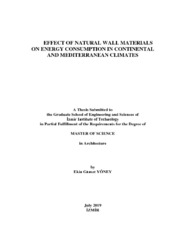Please use this identifier to cite or link to this item:
https://hdl.handle.net/11147/7428Full metadata record
| DC Field | Value | Language |
|---|---|---|
| dc.contributor.advisor | İlal, Mustafa Emre | - |
| dc.contributor.author | Yöney, Ekin Gamze | - |
| dc.date.accessioned | 2019-12-05T11:06:27Z | |
| dc.date.available | 2019-12-05T11:06:27Z | |
| dc.date.issued | 2019-07 | - |
| dc.identifier.citation | Yöney, E. G. (2019). Effect of natural wall materials on energy consumption in continental and mediterranean climates. Unpublished master's thesis, İzmir Institute of Technology, İzmir, Turkey | en_US |
| dc.identifier.uri | https://hdl.handle.net/11147/7428 | - |
| dc.description | Thesis (Master)--Izmir Institute of Technology, Architecture, Izmir, 2019 | en_US |
| dc.description | Includes bibliographical references (leaves: 125-133) | en_US |
| dc.description | Text in English; Abstract: Turkish and English | en_US |
| dc.description.abstract | Concern on earth and other natural building materials has been increased by rise of energy shortage and environmental problems. Not only the speed, quality and standardization in the production process of natural building materials should be improved, but also energy consumption of buildings constructed with these materials should be on acceptable levels in order to expend their usage. This study investigates the relationship between natural wall materials and energy consumption on two adobe buildings from Continental and Mediterranean climates. Totally 20 different wall options, composed of adobe, vertical hollow brick, limestone, hempcrete and strawbale with 0.30- and 0.50-meter thickness without and with flax thermal insulation material are tested with different combinations of direction and climate. The digital models of case buildings in Continental and Mediterranean climates are created to examine the question of in what climate and which direction a wall material is appropriate for energy efficient design. Consequently, strawbale enables the minimum annual energy consumption both for Mediterranean and Continental climates, while adobe shows better energy performance in summer period of Continental climate. Besides, it is observed that the energy consumption for cooling in case building of Mediterranean climate is 10 times more than of Continental one for whatever material is tested. The quantitative research conducted with different natural wall materials makes it a logical choice in terms of opening the path of industrialization that is supported by the aim of this thesis. | en_US |
| dc.description.abstract | artan enerji darlığı ve çevre problemlerine bağlı olarak kerpiç ve diğer doğal yapı malzemelerine olan ilgi de artmıştır. Doğal yapı malzemelerinin kullanımının yaygınlaşabilmesi için üretim sürecinde hız, kalite ve standardizasyonun iyileşmesi kadar bu malzemeler ile üretilen binalarda enerji tüketiminin kabul edilebilir ölçülerde olması gereklidir. Bu çalışmada, Karasal ve Akdeniz iklimlerinde bulunan iki kerpiç yapıda doğal duvar malzemeleri ile enerji tüketimi ilişkisi incelenmiştir. Kerpiç, düşey delikli tuğla, kalker taşı, kenevir tuğla ve saman balyasının 0.30 ve 0.50 metrelik kalınlıkta, yalıtımsız veya geri dönüşümlü keten yünü yalıtımdan oluşan toplam 20 farklı duvar seçeneği farklı yön ve iklim kombinasyonlarında test edilmiştir. Bir duvar malzemesinin, hangi iklim ve ne yönde konumlandırılırsa minimum enerji tüketimi sağlayacağı sorusunu irdelemek amacıyla Karasal ve Akdeniz iklimlerinde yer alan örnek yapıların dijital modelleri hazırlanmıştır. Sonuç olarak saman balyası her iki iklim için de minimum yıllık enerji tüketimi sağlarken, kerpicin karasal iklimde yaz boyunca daha iyi enerji performansı gösterdiği görülmüştür. Bunun yanında, Akdeniz ikliminde yer alan binada hangi malzeme test edilirse edilsin, soğutma amaçlı tüketimin Karasal iklimdeki binadan yaklaşık 10 kat daha fazla olduğu tespit edilmiştir. Farklı doğal duvar malzemeleri ile gerçekleştirilen bu nicel araştırma, tezin amacı olarak da desteklenen malzemelerin sanayileşme yollarının açılması bakımından da mantıklı bir seçim haline geldiğini göstermektedir. | en_US |
| dc.format.extent | xvii, 133 leaves | - |
| dc.language.iso | en | en_US |
| dc.publisher | Izmir Institute of Technology | en_US |
| dc.rights | info:eu-repo/semantics/openAccess | en_US |
| dc.subject | Energy consumption | en_US |
| dc.subject | Hempcrete | en_US |
| dc.subject | Natural building materials | en_US |
| dc.subject | Strawbale | en_US |
| dc.title | Effect of Natural Wall Materials on Energy Consumption in Continental and Mediterranean Climates | en_US |
| dc.title.alternative | Karasal ve Akdeniz İklimlerinde Doğal Duvar Malzemelerinin Enerji Tüketimi Üzerine Etkisi | en_US |
| dc.type | Master Thesis | en_US |
| dc.institutionauthor | Yöney, Ekin Gamze | - |
| dc.department | Thesis (Master)--İzmir Institute of Technology, Architecture | en_US |
| dc.relation.publicationcategory | Tez | en_US |
| dc.identifier.wosquality | N/A | - |
| dc.identifier.scopusquality | N/A | - |
| item.openairecristype | http://purl.org/coar/resource_type/c_18cf | - |
| item.languageiso639-1 | en | - |
| item.openairetype | Master Thesis | - |
| item.grantfulltext | open | - |
| item.fulltext | With Fulltext | - |
| item.cerifentitytype | Publications | - |
| Appears in Collections: | Master Degree / Yüksek Lisans Tezleri | |
Files in This Item:
| File | Description | Size | Format | |
|---|---|---|---|---|
| T001943.pdf | MasterThesis | 4.89 MB | Adobe PDF |  View/Open |
CORE Recommender
Page view(s)
270
checked on Mar 31, 2025
Download(s)
270
checked on Mar 31, 2025
Google ScholarTM
Check
Items in GCRIS Repository are protected by copyright, with all rights reserved, unless otherwise indicated.